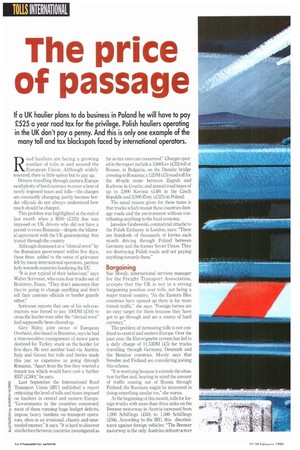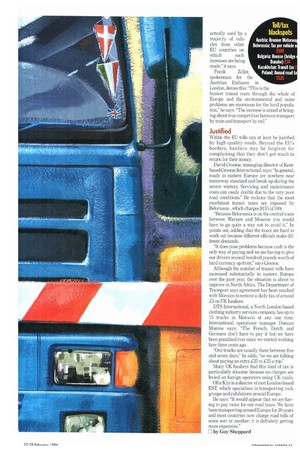The price of passage
Page 36

Page 37

If you've noticed an error in this article please click here to report it so we can fix it.
if a UK haulier plans to do business in Poland he will have to pay £525 a year road tax for the privilege. Polish hauliers operating in the UK don't pay a penny. And this is only one example of the many toll and tax blackspots faced by international operators.
Road hauliers are lacing a growing number of tolls in and around the European Union. Although widely resented, there is little option but to pay up.
Drivers travelling through eastern Europe need plenty of hard currency to cover a host of newly imposed taxes and tolls—the charges are constantly changing, partly because border officials do not always understand how much should be charged.
This problem was highlighted at the end of last month when a $500 (£325) fine was imposed on UK drivers who did not have a permit to cross Romania—despite the bilateral agreement with the UK guaranteeing free transit through the country.
Although dismissed as a "clerical error" by the Romanian government within five days, these fines added to the sense of grievance felt by many international operators, particularly towards countries bordering the EU.
"It is just typical of their behaviour," says Walter Scrivener, who runs four trucks out of Braintree, Essex. They don't announce that they're going to change anything and don't tell their customs officials or border guards either."
Scrivener reports that one of his sub-contractors was forced to pay 100DM (£44) to (-TOSS the border even after the "clerical error" had supposedly been cleared up.
Gary Haley, joint owner of European Overland, also based in Braintree, says he had a time-sensitive consignment of motor parts destined for Turkey stuck on the border for five days. He sent another load via Austria, Italy and Greece hut tolls and ferries made this just as expensive as going through Romania. "Apart from the fine they wanted a transit tax which would have cost a further $557 (£360)," he says.
Last September the International Road ,z 6 Transport Union (IRU) published a report criticising the level of tolls and taxes imposed on hauliers in central and eastern Europe. 0 ,. z Governments in the countries concerned, a
1most of them running huge budget deficits, 6 impose heavy burdens on transport opera2 tors, often in an irrational, chaotic and unat tended manner," it says. "It is hard to discover .1 similarities between countries investigated as
far as tax rates are concerned." Charges quoted in the report include a 3,600Ley (£32) toll at Rousse, in Bulgaria, on the Danube bridge crossing to Romania; a 12DM (.C5) road toll for the 40-mile route between Zagreb and Karlovac in Croatia; and annual road taxes of up to 2,000 Koruna (£.48) in the Czech Republic and 2,000 Zloty (£525) in Poland.
The usual reason given for these taxes is that trucks which transit these countries damage roads and the environment without contributing anything to the local economy.
Jaroslaw Grabowski, commercial attaché to the Polish Embassy in London, says: "There are hundreds of thousands of lorries each month driving through Poland between Germany and the former Soviet Union. They are destroying Polish roads and not paying anything towards them."
Bargaining
Sue Moody, international services manager for the Freight Transport Association, accepts that the UK is not in a strong bargaining position over tolls, not being a major transit country. "As the Eastern Bloc countries have opened up there is far more transit traffic," she says. "Foreign lorries are an easy target for them because they have got to go through and are a source of hard currency" The problem of increasing tolls is not confined to central and eastern Europe. Over the past year, the Eurovignette system has led to a daily charge of 11.53DM (£5) for trucks travelling through Germany, Denmark and the Benelux countries. Moody says that Sweden and Finland are considering joining this scheme.
"It is worrying because it extends the situation further and, bearing in mind the amount of traffic coming out of Russia through Finland, the Russians might be interested in doing something similar too," she warns.
At the beginning of this month, tolls for foreign trucks with more than three axles on the Brenner motorway in Austria increased from 1,000 Schillings (£63) to 1,500 Schillings (04). According to the IRU, this discriminates against foreign vehicles: "The Brenner motorway is the only Austrian infrastructure actually used by a majority of vehicles from other EU countries on which such increases are being made," it says.
Frank Zeller, spokesman for the Austrian Embassy in London, denies this: "This is the busiest transit route through the whole of Europe and the environmental and noise problems are enormous for the local population," he says. "The increase is aimed at bringing about true competition between transport by train and transport by rail."
Justified
Within the EU tolls can at least be justified by high-quality roads. Beyond the EU's borders, hauliers may be forgiven for complaining that they don't get much in return for their money.
David Croome, managing director of Kentbased Croome International, says: "In general, roads in eastern Europe are nowhere near motorway standard and break up during the severe winters, Servicing and maintenance costs can easily double due to the very poor road conditions." He reckons that the most exorbitant transit taxes are imposed by Belorussia ,which charges $155 (.,CI 00).
"Because Belorussia is on the central route between Warsaw and Moscow you would have to go quite a way out to avoid it," he points out, adding that the taxes are hard to work out because different officials make different demands.
"It does pose problems because cash is the only way of paying and we are having to give our drivers several hundred pounds worth of hard currency up front," says Croome.
Although the number of transit tolls have increased substantially in eastern Europe over the past year, the situation is about to improve in North Africa. The Department of Transport says agreement has been reached with Morocco to remove a daily tax of around £5 on UK hauliers.
DTS International, a North London-based clothing industry services company, has up to 15 trucks in Morocco at any one time. International operations manager Duncan Munroe says: "The French, Dutch and Germans don't have to pay it but we have been penalised ever since we started working here three years ago.
"Our trucks are usually there between five and seven days," he adds, "so we are talking about paying an extra £25 to .E.35 a trip."
Many UK hauliers find this kind of tax is particularly irksome because no charges are levied on foreign operators using UK roads.
011ie Kite is a director of east London-based EST, which specialises in transporting rock groups and exhibitions around Europe.
He says: "It would appear that we are having to pay twice for our road taxes. We have been transporting around Europe for 20 years and most countries now charge road tolls of some sort or another; it is definitely getting more expensive."
0 by Guy Sheppard




































































































